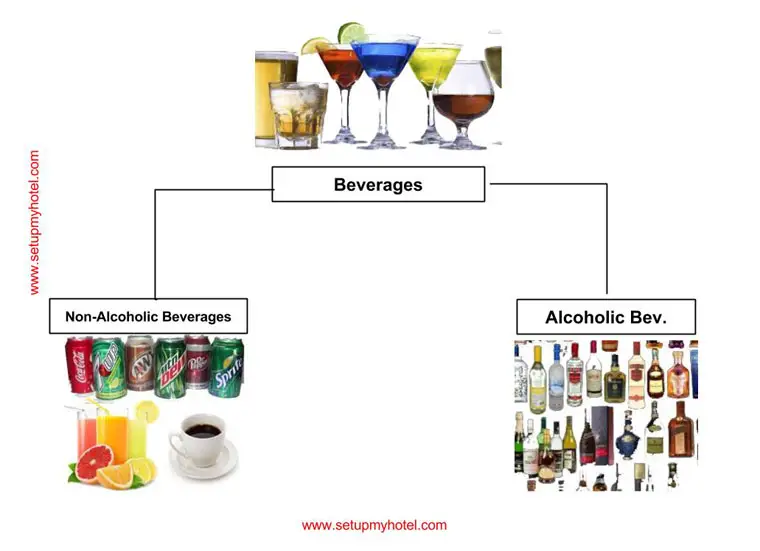What are beverages or Classification of Beverages?
‘Beverages’ is a drink other than water; an explanation in a commercial context. Beverages are further divided into ‘Alcoholic beverages’ and ‘Non-alcoholic’ beverages.
Non-alcoholic beverages
Non-alcoholic beverages refer to non-intoxication drinks or sweet carbonated drinks, which don’t have any liquor percentage in other words yeast is not introduced to convert sugar into alcohol during the fermentation process.
Soft drinks come in different varieties like chilled, hot, bottled, canned, or open liquids. The bottles or cans of drinks are hygienically packed, e.g. aerated waters, mineral water, juices, squashes, syrups, smoothies, shakes, etc. to be consumed as and when required.
Alcoholic Beverages
These are portable liquids that contain 1% to 75% of liquor. They are produced by the introduction of yeast for fermentation into substances such as Grapes, Grains, Barley, Fruits, Sugarcane, and Rice.
Some examples of Alcoholic beverages are Wine, Champagne, Beer, Whiskey, Brandy, Aperitif, digestive, Liqueur, Spirits, Sake, Rice Wine and Cocktails.
Beverages, commonly known as drinks or liquids, are consumable fluids that people consume for various reasons, including quenching thirst, providing refreshments, or enjoying their taste. Beverages can be classified based on several factors, including their composition, preparation methods, and usage. Here are some common classifications of beverages:
- Non-Alcoholic Beverages:
- Water: The most essential and common beverage.
- Soft Drinks: Carbonated beverages, often flavored, including sodas, colas, and fruit-flavored drinks.
- Fruit Juices: Extracts from fruits, either freshly squeezed or processed.
- Milk and Dairy Drinks: Includes milk, yogurt, and flavored milk drinks.
- Tea: Prepared by steeping tea leaves in hot water.
- Coffee: Made by brewing ground coffee beans with hot water.
- Alcoholic Beverages:
- Beer: Fermented beverage made from malted barley.
- Wine: Fermented grape juice, with variations like red, white, and sparkling wines.
- Spirits or Hard Liquor: Distilled alcoholic beverages, such as whiskey, vodka, rum, gin, and brandy.
- Hot Beverages:
- Tea
- Coffee
- Hot Chocolate: A warm beverage made with cocoa powder, milk, and sugar.
- Cold Beverages:
- Iced Tea
- Iced Coffee
- Cold Brew Coffee
- Chilled Juices
- Functional Beverages:
- Sports Drinks: Designed to hydrate and replenish electrolytes during physical activity.
- Energy Drinks: Contain stimulants like caffeine for a quick energy boost.
- Enhanced Water: Water infused with vitamins, minerals, or flavors.
- Carbonated Beverages:
- Sodas: Flavored and sweetened carbonated beverages.
- Sparkling Water: Carbonated water without added flavors or sweeteners.
- Natural Beverages:
- Fruit Smoothies: Blended fruits with yogurt, milk, or juice.
- Vegetable Juices: Extracts from vegetables, often consumed for their health benefits.
- Cocktails:
- Mixed beverages combining various spirits and non-alcoholic ingredients to create unique flavors.
- Milk Alternatives:
- Soy Milk, Almond Milk, Coconut Milk: Non-dairy alternatives to traditional milk.
- Infusions:
- Herbal Teas: Beverages made by steeping herbs, flowers, or plant extracts in hot water.
- Mocktails:
- Non-alcoholic cocktails, often creatively crafted with various juices, syrups, and garnishes.
These classifications provide a broad overview, and there are numerous subcategories and variations within each type of beverage. Additionally, cultural and regional preferences play a significant role in the popularity and variety of beverages worldwide.










